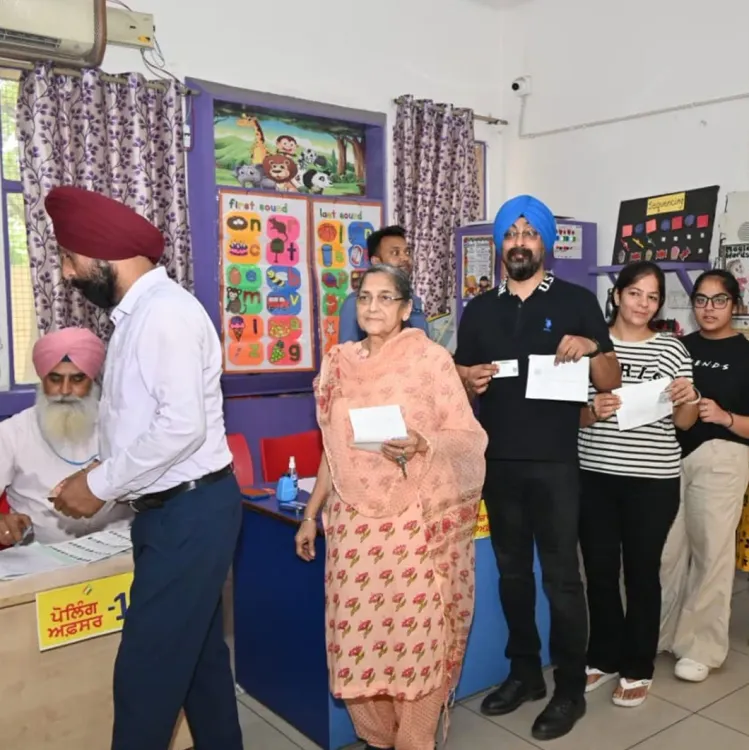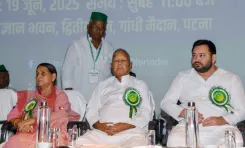What is the Voter Turnout in Ludhiana (West) Assembly Bypolls?

Synopsis
Key Takeaways
- 33% voter turnout by 1 p.m.
- 194 polling booths established for the elections.
- Vote counting scheduled for June 23.
- Key candidates from AAP, Congress, BJP, and Akali Dal.
- Security measures in place at 54 locations.
Chandigarh, June 19 (NationPress) Approximately 33 percent of eligible voters participated in the elections on Thursday until 1 p.m., aiming to select a legislator for the Ludhiana (West) constituency, which became vacant following the passing of AAP MLA Gurpreet Bassi Gogi in January.
Voting commenced at 7 a.m. Initially, the polling rate was 8.50 percent in the first two hours, which increased to 21.51 percent by 11 a.m. The polling at 194 booths will continue until 6 p.m.
Vote counting is scheduled for June 23, coinciding with four other Assembly seats: two in Gujarat and one each in Kerala and West Bengal.
The ruling Aam Aadmi Party is striving to maintain control of the seat, while the principal opposition, Congress, seeks to regain a seat it has held six times previously. In total, 14 candidates are contesting for this urban constituency.
The BJP and Shiromani Akali Dal have also nominated candidates for this seat. The main competition appears to be between AAP’s candidate Sanjeev Arora, a Rajya Sabha member and local industrialist, and Congress’ former minister Bharat Bhushan Ashu, who previously represented the seat twice from 2012.
Ashu had lost to his friend-turned-adversary Gogi, aged 58, by a margin of 7,512 votes in the 2022 Assembly elections.
The BJP has nominated Jiwan Gupta, a core committee member of the party's state unit, whereas its former ally, Akali Dal, has placed its trust in Parupkar Singh Ghuman, a former president of the Ludhiana Bar Association.
Chief Electoral Officer (CEO) Sibin C. mentioned that 174,437 voters, including 84,825 women and 10 third-gender voters, will cast their ballots at 194 polling booths across 66 locations. These include 10 model booths, one all-women booth, one eco-friendly booth, and one operated by Public Works Department (PWD) personnel. Additionally, 13 booths have been marked as critical, with paramilitary forces deployed.
To assist senior citizens, individuals with disabilities, and those with health concerns, home voting was arranged for 239 participants. Security checkpoints have been set up at 54 locations throughout the constituency, with all activities closely monitored by security forces.
Speculation thrives in political circles that AAP convener Arvind Kejriwal, who has recently been active in Punjab politics after facing a significant defeat in the Delhi Assembly elections, may transition to the Rajya Sabha if Sanjeev Arora secures a victory. However, the party denies any such plans.
Notably, in October 2024, the Enforcement Directorate (ED) conducted a raid at Arora’s residence as part of an investigation into a money laundering case related to land fraud.
The BJP, expanding its influence in the state's Hindu-majority urban areas, aims to present a formidable challenge to both the ruling AAP and Congress by introducing a strong local candidate with grassroots connections.
In the lead-up to the elections, the Bharatiya Janata Party launched a sharp critique of AAP's governance over the past three years, accusing them of transforming the state into a “rehabilitation center” for Kejriwal's rejected loyalists from Delhi.
BJP leaders such as Tarun Chugh, Delhi Chief Minister Rekha Gupta, and Manjinder Singh Sirsa stated that AAP is systematically placing favored individuals in significant administrative roles, undermining Punjab's autonomy.
They contend that Chief Minister Bhagwant Mann has become a “rubber stamp” while Kejriwal operates as a remote puppet master.
AAP state President Aman Arora asserted that the campaign atmosphere indicates a significant victory for the AAP candidate Arora.






